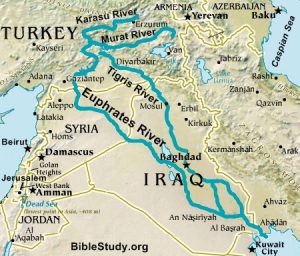
“Euphrates River Map.” Euphrates River Map, The Bible Study Site, www.biblestudy.org/maps/euphrates-river-valley-map.html.
For me, the most interesting themes of this week revolved around water. I was surprised to find how much the political ecology of water can affect different groups. I think the common thought is that water is so plentiful that there is no reason for conflict or differing access to it to be a problem. This view is especially present in the western world where water is as available as turning a tap, leading to us taking it for granted.
One of the ways this manifests is the perception some people have of water as a limitless resource. It is easy to look at rivers and wells and think that there is no end to the supply of water. However, as we learned in this lesson neither is in fact limitless. Regarding wells, we can see how the political ecology of water can destroy livelihoods. Take the case of India where large agribusinesses have built deep wells into aquifers that are supplying the entire region with water. Since the total amount of water being pumped out is greater than what is being replenished the wells are drying up starting with the shallowest wells, which are often owned or operated by the poorest farmers. This leads to poor farmers being unable to irrigate their farms and being forced to move to cities.
We can see that rivers too can be the cause of problems, perhaps even on a larger scale than wells. As we learned in the readings Turkey has built a dam in the Euphrates river and used much of the Euphrates’s water to irrigate its farms. This has caused the amount of water accessible to the countries downstream of turkey to be significantly lessened. This type of situation causes political tension between the countries that can potentially escalate into armed conflict. However, it also causes the people who were dependent upon that flow to lose access to water for their crops. Again, it is the poorest who are most adversely affected by these changes as they are more likely to not have the social or economic safety net needed to adapt or move successfully.
In this way, I find the lens of political ecology helpful because it debunks the notion that water is available to everyone, or that everyone has equal access. Clearly, we have seen that the poorest people are the ones who are losing access to water. This is caused in part by a lack of political policies in place to protect poor farmers, and a lack of economic power to compete with large businesses. Therefore, poor farmers are losing their livelihoods and ability to feed themselves.
